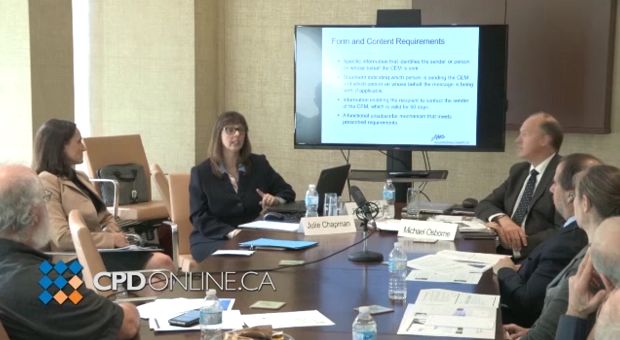
To purchase this video please click “Add to Cart”.
Login to watch this video if you have a subscription. Learn more about subscriptions.Canada’s Anti-Spam Law (CASL) applies to anyone who uses electronic communication to engage in any kind of commercial transaction, including businesses, charities, and clubs. CASL makes it presumptively unlawful to use email and text messages for commercial purposes, unless strict requirements are met. The CRTC has made it clear that it will expect businesses that fall short of a standard of perfection to volunteer to pay fines.
Now, starting in July 2017, class actions seeking damages against companies that use email to do business will be possible. This nutshell will help you and your clients to develop compliance to mitigate regulatory and class action risks associated with CASL.
Julie Chapman: Practice management tips and Compliance Training
Julie Chapman & Jillian Swartz: Client Service and Practice Management
Michael Osborne advises and represents businesses in competition law, advertising, anti-spam, and other regulatory matters. Michael also practices commercial litigation and arbitration.
Michael has acted as trial and appellate counsel before courts, administrative tribunals (particularly the Competition Tribunal), and domestic and international arbitral tribunals. Michael is a Fellow of the Chartered Institute of Arbitrators.
Michael was called to the Bar in Ontario in 1998, after completing his articles as a Law Clerk to the late Justice John Sopinka of the Supreme Court of Canada. He received his LL.B. from Dalhousie University in 1996, his M.A. from the University of Toronto in 1991, and his B.A. from the University of Saskatchewan in 1988.
Michael is an active member of the Canadian Bar Association’s Competition Law Section, the American Bar Association’s Anti-trust Section, the Advocates’ Society, the Toronto Commercial Arbitration Society, and the Toronto Lawyers’ Association.
Jillian’s practice focuses on technology law, mergers and acquisitions, corporate governance and not-for-profit law. Jillian counsels clients on a wide variety of transactional matters and commercial arrangements, including private equity and venture capital investments, joint ventures, corporate reorganizations, shareholder and partnership agreements, consulting and transition services arrangements, and outsourcing agreements.
She regularly advises Canadian and international clients on Canada’s anti-spam law and has presented and written extensively in both Canada and the United States on this emerging area of law.
Jillian was called to the Bar in Ontario in 1996. She earned her LL.B. from University of Toronto in 1994 and her H.B.B.A. from Wilfrid Laurier University in 1991.